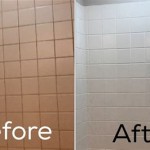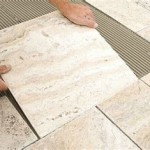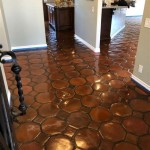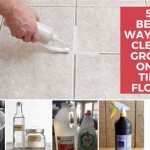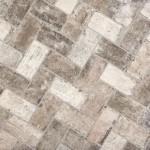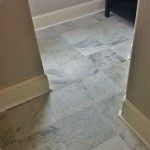How To Remove Hard Water Stains From Tile Floors In Shower
Hard water, rich in minerals like calcium and magnesium, can leave unsightly stains on tile floors in showers. These stains, often appearing as white or cloudy deposits, are the result of mineral buildup over time. Removing hard water stains requires consistent effort and the use of appropriate cleaning methods. This article outlines several effective techniques for eliminating these stubborn stains and restoring the shine to shower tile floors.
Understanding Hard Water Stains
Hard water stains are primarily composed of calcium and magnesium carbonates. When hard water evaporates, these minerals remain behind, forming a scale or film on surfaces. In the shower, this process is accelerated by the constant exposure to water and humidity. The porous nature of grout further exacerbates the problem, as it easily absorbs minerals, leading to discoloration and staining.
Identifying hard water stains is crucial for selecting the right cleaning approach. Unlike soap scum, which typically appears as a greasy or waxy film, hard water stains tend to be harder and more difficult to remove with standard cleaning products. They often have a chalky or crusty texture. Neglecting to address these stains can lead to significant buildup, making removal increasingly challenging over time.
Factors that influence the severity of hard water stains include the hardness of the water supply, the frequency of shower use, and the ventilation within the shower area. Areas with extremely hard water will experience more rapid mineral deposition. Poor ventilation can also contribute to the problem by slowing down the evaporation process, allowing minerals more time to settle on surfaces.
Preventative measures, such as installing a water softener, can significantly reduce the occurrence of hard water stains. Regular cleaning and drying of shower surfaces after each use can also help to minimize mineral buildup.
Effective Cleaning Methods
Several cleaning methods can effectively remove hard water stains from tile floors in showers. The choice of method will depend on the severity of the staining and the type of tile. It is always advisable to test any cleaning solution on a small, inconspicuous area of the tile before applying it to the entire surface to ensure that it does not cause damage or discoloration.
One of the most common and effective methods involves utilizing acidic cleaners. Acidity helps to dissolve the mineral deposits that form hard water stains. Vinegar, lemon juice, and commercially available acid-based tile cleaners are all viable options. The following sections describe these methods in detail.
Vinegar Solution
Vinegar, a readily available household item, is a mild acid that can effectively dissolve hard water stains. To use vinegar as a cleaner, mix equal parts white vinegar and water in a spray bottle. Spray the solution liberally onto the affected areas of the tile floor, ensuring that the grout lines are thoroughly soaked.
Allow the vinegar solution to dwell on the stains for 15-30 minutes. This dwell time allows the acid to penetrate and loosen the mineral deposits. For stubborn stains, the dwelling time may need to be extended.
After the dwelling time, scrub the tile floor with a scrub brush or sponge. Pay particular attention to the grout lines, as these are often more heavily stained. A grout brush can be used to effectively clean narrow grout lines.
Rinse the tile floor thoroughly with clean water to remove any remaining vinegar residue. Vinegar has a strong odor, so proper rinsing is essential to prevent lingering smells. Dry the tile floor with a clean towel to prevent water spots.
If the vinegar solution is not effective on heavily stained areas, consider using undiluted vinegar. However, use caution when applying undiluted vinegar, as it can be more aggressive and may damage certain types of tile or grout. Always test in an inconspicuous area first.
Lemon Juice
Lemon juice, like vinegar, is a natural acid that can effectively dissolve hard water stains. The process for using lemon juice is similar to that for vinegar. Squeeze fresh lemon juice onto the stained areas of the tile floor, or apply it with a sponge or cloth.
Allow the lemon juice to dwell on the stains for 15-30 minutes. The citric acid in lemon juice will help to break down the mineral deposits. Lemon juice also has a pleasant scent, which can help to mask any unpleasant odors in the shower.
Scrub the tile floor with a scrub brush or sponge, paying attention to the grout lines. Rinse the tile floor thoroughly with clean water to remove any remaining lemon juice residue. Dry the tile floor with a clean towel.
For particularly stubborn stains, consider using a lemon wedge to scrub the affected area directly. The abrasive texture of the lemon can help to remove mineral deposits more effectively.
Commercial Acid-Based Cleaners
Several commercially available tile cleaners are specifically formulated to remove hard water stains. These cleaners often contain stronger acids than vinegar or lemon juice and may be more effective on heavily stained surfaces.
When using commercial acid-based cleaners, it is essential to follow the manufacturer's instructions carefully. Wear gloves and eye protection to protect against chemical irritation. Ensure that the shower area is well-ventilated to avoid inhaling fumes.
Apply the cleaner to the affected areas of the tile floor and allow it to dwell for the recommended time. Scrub the floor with a scrub brush or sponge and rinse thoroughly with clean water. Dry the tile floor with a clean towel.
Be aware that some acid-based cleaners can be corrosive and may damage certain types of tile or grout. Always test the cleaner in an inconspicuous area before applying it to the entire surface. Avoid using these cleaners on natural stone tiles, as they can etch the surface.
Alternative Cleaning Agents and Techniques
In addition to acidic cleaners, other cleaning agents and techniques can be used to remove hard water stains from tile floors in showers. These methods may be more suitable for less severe staining or for those who prefer to avoid using harsh chemicals.
Baking soda, a mild abrasive, can be used to scrub away hard water stains. A paste of baking soda and water can be applied to the stained areas and scrubbed with a brush or sponge. Baking soda is a gentle cleaner that is unlikely to damage tile or grout.
Borax, a natural mineral, can also be used as a cleaning agent. Mix borax with water to create a paste and apply it to the stained areas. Scrub the floor and rinse thoroughly with clean water.
Steam cleaning is another effective method for removing hard water stains. The high temperature steam can loosen mineral deposits and kill mold and mildew. Use a steam cleaner with a brush attachment to scrub the tile floor.
A magic eraser, made of melamine foam, can also be used to remove hard water stains. Wet the magic eraser and gently scrub the stained areas. Magic erasers are effective at removing a variety of stains, but they can be abrasive and may damage certain surfaces.
Using a water softener can prevent hard water stains from forming in the first place. Water softeners remove calcium and magnesium from the water, reducing the mineral content and preventing buildup on surfaces. Installing a water softener can be a significant investment, but it can save time and effort in the long run by minimizing the need for frequent cleaning.
Regular maintenance and cleaning are essential for preventing hard water stains from becoming severe. Wiping down shower surfaces after each use and ensuring adequate ventilation can help to minimize mineral buildup. Applying a tile and grout sealant can also help to protect surfaces from staining.

Stone Pro How To Remove Hard Water Spots In Showers

How To Remove Hard Water Stains Chet S Cleaning

Clean Hard Water Stains Tile Using White Vinegar Askthebuilder Com

Shower Cleaning Makeover Removing Limescale From Glass Door And Grout Tiles

3 Best Ways To Get Rid Of Hard Water Stains From Bathroom Tiles Kent

How To Remove Hard Water Stains From Tiles Myhomeware Blog
How To Clean Shower Stains Walls Floors Bees Housekeeping

How Hard Water Leads To More Tile Cleaning And Recaulking

A Guide To Removing Hard Water Stains From Any Surface

How To Clean Black Slate Tile Floors Doityourself Com
Related Posts

